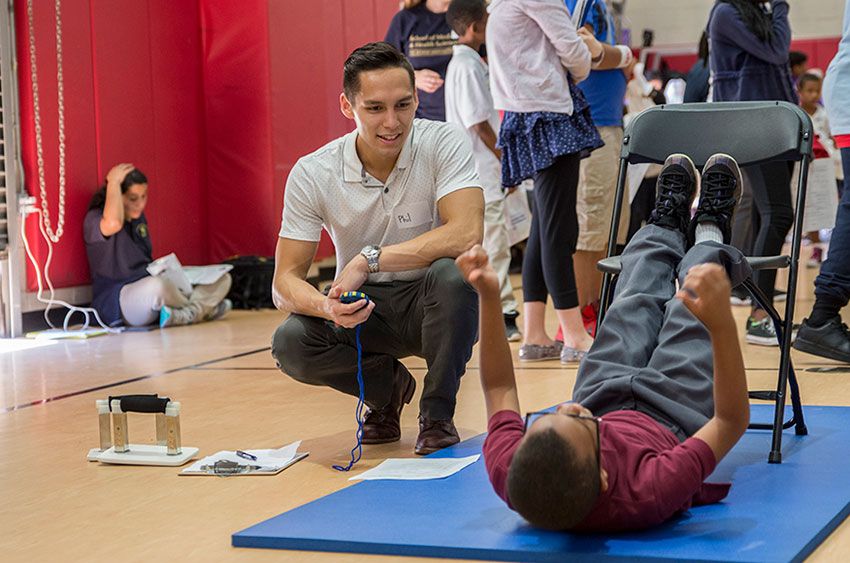
The main gym at Catholic University of America on Sept. 29 was a cacophony of laughter and chatter as health care professionals and students provided health services and education for young Special Olympics athletes.
At the event, hosted by Healthy Athletes for the DC Special Olympics, 46 physical therapy (PT) students and eight faculty and staff members from the George Washington University (GW) School of Medicine and Health Sciences (SMHS) were on hand to help with FUNFitness screenings, which test athletes’ flexibility, strength, balance, and aerobic fitness.
PT students assisted with a strength station, flexibility station, and step-and-balance test station, among others.
Erin Blaser, first-year PT student, worked at the flexibility table, where she helped measure how far the children could stretch their muscles. She said taking what she recently learned in the classroom and applying it in real practice was a great opportunity.
“Normally in class students practice on each other … it’s so different coaching someone who may not at first understand what you’re asking them to do, as opposed to coaching [your peers],” she said.
Over at the step-and-balance station, PT first-year Oliver Hecht measured a young man’s heart rate before coaching him in a stepping routine. Once the heart rate was recorded and the stepping activity completed, the information was added to Special Olympics Healthy Athletes program records. If the athletes needed further instruction on how to improve their quality of life through exercise, they were sent on to the next activity, an education booth.
“We have a lot of theoretical knowledge of how to do these things, and it’s great to bring it into the real-world and see how to deal with patients and interact with them,” Hecht said of the experience. “This is a very unique community in D.C., and it’s great to be part of a community like this; these kids are all great. It’s a fun opportunity for us.”
Erin Wentzell, DPT, assistant clinical professor of physical therapy and health care sciences at SMHS, who helped organize GW’s participation, praised the students’ efforts. “They worked so hard and did it with a smile and an energy that was inspiring and motivating to be around,” she said. “They did an amazing job screening the athletes, connecting with them, and promoting the field of physical therapy to the larger community.”
Martin Zenthoefer, another PT student helping at the flexibility station, said the event reminded him why he chose PT as a career. “This is only my second time working a Special Olympics event, so it was fun to learn what it’s like to work with these kids,” he said. “It’s just another way to confirm I’m really fulfilling my purpose and chose a career I’m going to be happiest in.”
Wentzell added that some health care providers can be hesitant about working with individuals with intellectual disabilities, and that it is only through education, exposure, and experience that those barriers between patient and medical provider can be broken down. “I see events like FUNfitness as a tremendous learning opportunity for the students, while giving back to some amazing athletes,” she said.


